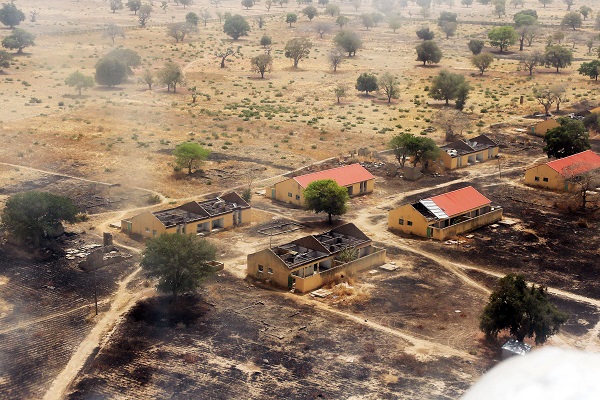
Chibok council area in Borno State lately came under fresh assault by terrorists. It was one more instance of serial security breaches that have afflicted the embattled community since the 14th April, 2014 attack on Government Girls Secondary School (GGSS), Chibok, in which 276 schoolgirls were herded into insurgents’ captivity, and out of which more than a hundred are yet to return.
The latest incident was reported last week in Kautikari village located eastwards of, and about 15 kilometers from Chibok town. Armed terrorists suspected to be members of the Islamic State in West Africa Province (ISWAP) were said to have staged an assault on the village, leaving no fewer than four residents dead and an unspecified number of women and children abducted. Many others who fled in the siege were unaccounted for. Houses and other structures in the community were reported torched. Reports said the insurgents invaded Kautikari at about 4p.m. penultimate Friday and operated unchallenged until they withdrew at about 7p.m. While in the community, they allegedly shot randomly at residents and set fire to houses and shops as they looted livestock and foodstuff. “Our people of Kautikari are displaced following the attack on the community last Friday, which is our market day. The armed insurgents killed four people, destroyed shops and looted food items. They also abducted scores of women and children, and many are still missing,” Vanguard newspaper cited a source close to the incident saying.
Since the 2014 attack on GGSS Chibok, there have been other assaults by insurgents on the territory. In February 2020, suspected ISWAP insurgents staged an early morning raid on Bambula in the Chibok council area, in which the community head of the Civilian Joint Task Force and others were abducted. That incident occurred barely a week after terrorists also attacked Kwallangulum community in Chibok, setting fire to many houses. On Christmas eve, same year, nearly 10 people were killed as insurgents stormed Pemi, a community close to Chibok, burning houses and looting food supplies meant to be distributed to residents to celebrate Christmas.
In the wake of the 2014 attack, some security architecture was reported erected in the precincts of Chibok to deter insurgents from further assaults in the area. But the recurrence of attacks in the vicinity raises a question about the effectiveness of the architecture put in place. Not that there isn’t improvement compared with the situation that predated the 2014 incident and immediately after it. Late in September 2021, the administration of Borno State Governor Babagana Zulum commissioned a remodelled and renovated GGSS Chibok now rechristened Government Secondary School, Chibok, having been converted to a mixed school from its all-female secondary boarding school status as at when the insurgents struck. At that commissioning, women affairs minister Pauline Tallen, who represented President Muhammadu Buhari, said the occasion evidenced a marked improvement in the security of the area and signposted the triumph of the community’s desire for education despite the attack by insurgents to dampen that desire. Also, the Buhari administration and the military, in particular, have repeatedly asserted that some normalcy has returned to the area and the insurgency largely defeated.
Much as one would’ve loved to be persuaded by the official narrative, the recurrence of insurgents’ attack in Chibok gives cause for concern. For instance, how much lesson was learnt from the notorious breach of 2014, and how much of what was learnt is now being proactively applied? While government often berates complaints by a cross-section of Nigerians that the level of insecurity in the land is yet high, the evidence from Chibok and other areas like Zamfara, Niger and Kaduna states gives rationale to those complaints. It is high time the military deployed proactive intelligence to forestall attacks by insurgents, especially on communities they staged successful attacks in the past. When sages say affliction does not arise a repeated time, they mean only for the wise.


















































